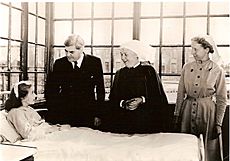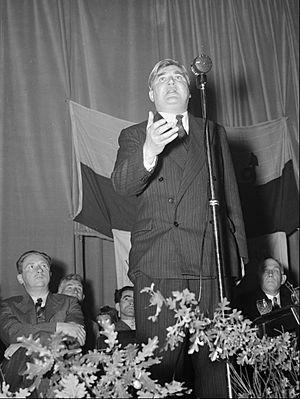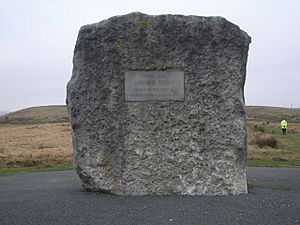Aneurin Bevan facts for kids
Quick facts for kids
Aneurin Bevan
|
|
|---|---|
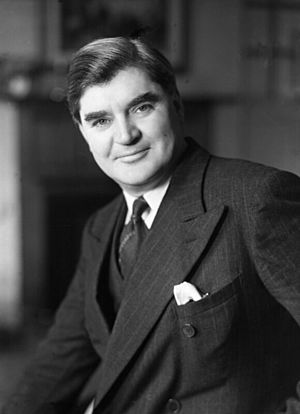
Bevan in 1943
|
|
| Deputy Leader of the Labour Party | |
| In office 4 May 1959 – 6 July 1960 |
|
| Leader | Hugh Gaitskell |
| Preceded by | Jim Griffiths |
| Succeeded by | George Brown |
| Shadow Foreign Secretary | |
| In office 22 July 1956 – 4 May 1959 |
|
| Leader | Hugh Gaitskell |
| Preceded by | Alf Robens |
| Succeeded by | Denis Healey |
| Minister of Labour and National Service | |
| In office 17 January 1951 – 23 April 1951 |
|
| Prime Minister | Clement Attlee |
| Preceded by | George Isaacs |
| Succeeded by | Alf Robens |
| Minister of Health | |
| In office 5 August 1945 – 17 January 1951 |
|
| Prime Minister | Clement Attlee |
| Preceded by | Henry Willink |
| Succeeded by | Hilary Marquand |
| Member of Parliament for Ebbw Vale |
|
| In office 31 May 1929 – 6 July 1960 |
|
| Preceded by | Evan Davies |
| Succeeded by | Michael Foot |
| Personal details | |
| Born | 15 November 1897 Tredegar, Monmouthshire, Wales |
| Died | 6 July 1960 (aged 62) Chesham, Buckinghamshire, England |
| Political party | Labour |
| Spouse | |
| Alma mater | Central Labour College, London |
Aneurin "Nye" Bevan (born 15 November 1897 – died 6 July 1960) was a Welsh politician from the Labour Party. He is most famous for creating the British National Health Service (NHS). This service provides medical care for everyone in the UK, free of charge.
Bevan also helped to establish the British welfare state, which is a system where the government helps its citizens with things like healthcare and social support. He was first elected as a MP for Ebbw Vale in 1929. Before becoming an MP, Bevan was active in miners' unions and played a big part in the 1926 general strike. Many people see him as one of the most important left-wing politicians in British history.
Bevan grew up in Monmouthshire, Wales, in a working-class family. His father was a coal miner, and Aneurin left school at 14. He started working in the mines as a teenager and quickly became involved in local miners' unions. At 19, he was elected head of his local Miners' Lodge, where he often spoke out against the mine owners. He joined the Labour Party and studied at the Central Labour College in London. After returning to South Wales, he struggled to find work for almost three years. He then became a union official, which led to his important role in the 1926 general strike.
In 1928, Bevan won a seat on the Monmouthshire County Council. The next year, he was elected as an MP for Ebbw Vale. In Parliament, he became known for strongly criticising other politicians, including Winston Churchill and David Lloyd George.
After the Second World War, Clement Attlee's Labour government chose Bevan as the Minister of Health. At 47, he was the youngest member of the cabinet. He was also in charge of housing. Inspired by the Tredegar Medical Aid Society in his hometown, Bevan pushed for a National Health Service. This service would offer free medical care across the UK, regardless of how much money people had. Despite opposition from other parties and the British Medical Association, the National Health Service Act 1946 was passed. The NHS officially started in 1948, taking over more than 2,500 hospitals in the UK.
In 1951, Bevan became the Minister of Labour. However, he resigned after only two months. This happened when the government suggested charging for dental and eye care prescriptions. They also planned to use money from the National Insurance Fund for military spending. Bevan's influence decreased after he left this role. A group within the Labour Party, not directly controlled by him, became known as "Bevanites."
When Attlee retired in 1955, Bevan tried to become the Labour Party leader but lost to Hugh Gaitskell. He then became the Shadow Foreign Secretary. In 1959, he was elected Deputy Leader of the Labour Party. He held this position for a year until he died from stomach cancer at 62.
Bevan's death in 1960 caused "an outpouring of national mourning." In 2004, he was voted first in a list of 100 Welsh Heroes. This shows how much he is remembered for his work in creating the UK's welfare state.
Contents
Early Life and Mining Work
Aneurin Bevan was born on 15 November 1897 in Tredegar, Monmouthshire. This was a mining town where most people worked in the local mines. His father, David Bevan, was a coal miner, and his mother, Phoebe, was a seamstress.
Both of Bevan's parents were Nonconformist Christians, meaning they were Protestants who were not part of the Church of England. However, Bevan later became an atheist. In his youth, he supported the Liberal Party. But he changed his views after reading the writings of Robert Blatchford and joined the Independent Labour Party.
Bevan went to Sirhowy Elementary School, but he didn't do very well. As a child, he developed a bad stammer, which made him a "lonely chap." His father died from pneumoconiosis, a lung disease caused by breathing in coal dust. At the time, this disease was not recognised for compensation.
Working in the Mines
At 13, Bevan worked as a butcher's boy. Soon after, he left school and started working at the Ty-Trist Colliery (coal mine). He earned about ten shillings a week, most of which went to his parents to help his family. He joined the local Plebs' League, where he studied topics like Marxism.
Bevan also became a member of the Tredegar branch of the South Wales Miners' Federation. He quickly became a trade union activist, fighting for miners' rights. At 19, he was the head of his local Miners' Lodge. During the First World War, he was called up for military service. He was briefly arrested when his sister burned his conscription papers. However, he was cleared in court because he had nystagmus, an eye condition.
Bevan was known as a strong speaker in his local area. His employers, the Tredegar Iron and Coal Company, saw him as a troublemaker. They tried to fire him, but with the support of the Miners' Federation, he was rehired. He and his brother later moved to other mines, but Bevan often clashed with management over safety issues.
Overcoming his Stammer and Education
In 1919, the Tredegar Labour Party was formed, and Bevan was chosen as a delegate. Although he lost an election, he gained attention. He won a scholarship to the Central Labour College in London, supported by the South Wales Miners' Federation. He spent two years there studying economics, politics, and history. He read about Marxism and developed his left-wing political ideas.
With the help of an elocution tutor, Bevan slowly began to overcome his stammer. He would practice long speeches by William Morris. He stayed at the college until 1921.
Bevan was a founding member of the "Query Club" with his brother Billy and Walter Conway. Conway, a local miner, advised Bevan on his stammer, saying, "if you can't say it, you don't know it." Bevan followed this advice, practicing his speeches to his friends. The club aimed to challenge the power of the Tredegar Iron and Coal Company in the town.
Unemployment and the General Strike
When Bevan returned home in 1921, the Tredegar Iron and Coal Company refused to re-employ him. He struggled to find work for several years. His family survived on his sister's wages and his father's sick pay. In 1925, his father died from pneumoconiosis.
In 1926, Bevan found work as a paid union official, earning £5 a week. This new job came just in time for him to lead the local miners during the General Strike. The strike began on 3 May 1926, and Bevan quickly became a leader among the South Wales miners. The miners stayed on strike for six months. Bevan was in charge of giving out strike pay in Tredegar and helped create the Council of Action, which raised money and provided food for the miners.
Aneurin Bevan in Parliament
In 1928, Bevan was elected to the Monmouthshire County Council. The next year, he became the Labour Party candidate for Ebbw Vale. He easily won the seat in the 1929 General Election, getting more than twice as many votes as his opponent.
Bevan saw the House of Commons as a place that valued old traditions. In Parliament, he became known for being a strong critic of politicians he felt were against working people. He criticised Conservative leader Winston Churchill and Liberal leader David Lloyd George. He also criticised some members of his own Labour party, like Ramsay MacDonald, for not increasing unemployment benefits.
Bevan had strong support from his local area. He was one of the few Labour MPs who didn't face opposition in the 1931 General Election. His support grew throughout the 1930s during the Great Depression.
Early Political Views
For a short time, Bevan was interested in the ideas of Oswald Mosley, another Labour MP. He signed a document called the Mosley Memorandum, which raised concerns about the government's failure to deal with unemployment. However, when Mosley left the Labour Party to form the New Party, Bevan refused to join him. By 1932, Mosley's party had moved to the far-right and became the British Union of Fascists. Bevan's past connection with Mosley was sometimes used against him by his political rivals.
In 1934, Bevan married Jennie Lee, who was also a Socialist MP. She was described as "more left-wing than Nye" and had a big influence on his political career. They both supported the socialists in the Spanish Civil War, and Bevan visited Spain in 1938. In 1936, he joined the board of the new socialist newspaper Tribune.
Bevan pushed for a "united socialist front" of all left-wing parties, including the Communist Party of Great Britain. This led to his brief expulsion from the Labour Party from March to November 1939. He was readmitted after agreeing to follow the party's policies.
Opposing the Wartime Government
During the Second World War, Bevan was a key leader of the left-wing group in the House of Commons. He often spoke out against the wartime Coalition government. Bevan was against the strict censorship of radio and newspapers. He also opposed Defence Regulation 18B, which allowed the government to imprison citizens without trial.
Bevan called for the nationalisation of the coal industry. He also wanted a Second Front in Western Europe to help the Soviet Union fight Germany. In one famous speech against Churchill, he said the Prime Minister "wins debate after debate and loses battle after battle." Churchill, in turn, called Bevan "a squalid nuisance." Bevan often criticised Churchill, partly because of Churchill's actions during the Tonypandy riots and the 1926 United Kingdom general strike.
Bevan believed that the Second World War would give Britain a chance to create "a new society." He famously said that the war would test social systems that were no longer working. At the start of the 1945 general election campaign, Bevan told his audience that his goal was to completely remove the Conservative Party from power and have 25 years of Labour government.
Aneurin Bevan in Government
The 1945 general election was a huge victory for the Labour Party. They won enough seats to put their plans into action and introduce major social reforms, known as the "Welfare State." These changes happened despite the country facing big financial problems after the war.
The new Prime Minister, Clement Attlee, made Bevan the Minister of Health. Bevan was also in charge of housing. This meant he was responsible for creating a new, complete National Health Service and solving the country's severe housing shortage after the war. At 47, Bevan was the youngest member of Attlee's Cabinet and it was his first time as a minister.
Bevan had often argued with Attlee and other Labour leaders like Ernest Bevin and Herbert Morrison. However, Attlee said Bevan was "starting with me with a clean sheet." Bevan immediately showed his independent spirit by wearing a regular suit to a royal banquet, refusing to wear formal attire.
Minister of Health (1945–1951)
The National Health Service (NHS) was designed to be free for everyone and paid for by public money. Bevan was inspired by the Tredegar Medical Aid Society in his hometown. In Tredegar, people paid a small fee to get free medical and dental care. In 1947, Bevan said, "All I am doing is extending to the entire population of Britain the benefits we had in Tredegar for a generation or more."
The government increased taxes, especially for wealthy business owners, to pay for the welfare state. This was part of Labour's plan to share wealth from large industries with working people. Bevan had experience with health services from his time on the Cottage Hospital Management Committee. This experience helped him greatly in creating the NHS.
On 5 July 1948, Bevan's National Health Service Act 1946 officially began. Bevan attended a ceremony at the Park Hospital, Trafford, where he symbolically received the keys to the hospital. He had to overcome strong opposition from the Conservative Party and even from within his own party.
The British Medical Association (BMA) was a major opponent. Their leader, Charles Hill, called Bevan "a complete and uncontrolled dictator." Doctors threatened not to support the NHS just months before it launched. After 18 months of arguments, Bevan finally won over most doctors. He made a few small changes, like allowing consultants to keep their private practices. But he did not change the main ideas of the NHS.
About 2,688 hospitals in England and Wales became part of the NHS under Bevan's control. Two key parts of his plan were taking over hospitals and stopping doctors from selling their practices. This aimed to provide the same good quality of care across the country. It also helped new doctors avoid large debts.
Conservatives worried that free healthcare would be overwhelmed. At first, this was true, and the service went over budget in its first year. Bevan argued that this was because of years of underinvestment in the British medical system before the war. By the early 1950s, the initial overspending had stopped.
Housing Reform
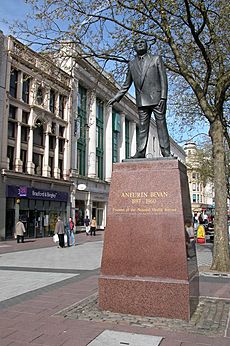
When Bevan became a minister in 1945, he wanted social housing to be like the NHS. He wanted everyone to have access to good, affordable homes. People could still choose to own their homes or rent privately. The government also offered grants to improve existing homes.
Britain had suffered a lot of bombing damage during the war, with over 700,000 homes needing repair in London alone. There were also many old, poor-quality homes. These problems, along with shortages of building materials and skilled workers, made Bevan's housing goals very difficult. Bevan also wanted new homes to be bigger and better quality.
In 1946, 55,600 new homes were built. This number rose to 139,600 in 1947 and 227,600 in 1948. Building 850,000 homes in the four years after the war was a huge achievement. However, some people felt it was less than what his Conservative successor, Harold Macmillan, achieved later. Macmillan built more homes by lowering quality standards and focusing only on housing, while Bevan also managed health.
In 1948, Bevan made a famous speech where he said he had a "deep burning hatred for the Tory Party" and called them "lower than vermin." This comment led angry Conservatives to create the Vermin Club. Some believed his words cost the Labour Party millions of votes.
In 1951, Bevan was a top choice for Foreign Secretary. However, Prime Minister Attlee chose Herbert Morrison instead. Attlee did not trust Bevan's personality and thought he was too impulsive.
Minister of Labour (1951)
Bevan was instead appointed Minister of Labour in January 1951. Some saw this as a less important role. During his time in this job, he helped get a good pay raise for railway workers.
However, three months later, Hugh Gaitskell proposed charging for dental care and spectacles. This was to save money for the Korean War. Bevan was furious and said he would never be part of a government that charged for NHS services. He resigned from his position two weeks later, protesting both the charges and the increase in military spending. Two other ministers, John Freeman and Harold Wilson, also resigned.
Later that year, the Labour Party lost the general election. After leaving the Health Ministry in 1951, Bevan never reached the same level of success. He often argued with other Labour leaders. Historian Kenneth O. Morgan said, "Bevan alone kept the flag of left-wing socialism aloft."
Aneurin Bevan in Opposition
Bevan's last ten years in politics saw his influence decrease. In 1952, he published In Place of Fear, a widely read socialist book. In it, he wrote about his early life as a miner and his search for power for working people.
Out of office, Bevan made the split within the Labour Party worse. He led the left-wing group, known as the Bevanites. They criticised the right-wing "Gaitskellites" for high defence spending, especially on nuclear weapons. They also wanted better relations with the Soviet Union.
In April 1954, Bevan resigned from the Parliamentary Labour Party. He had accused the Labour leader, Attlee, of giving in to American pressure over a defence organisation in Asia. He later said he resigned to show that the party was in "grave crisis." In July, Bevan announced he would run for Treasurer of the Labour Party against Hugh Gaitskell. However, two major unions supported Gaitskell, and Bevan lost.
In March 1955, Bevan led a group of 57 Labour MPs who voted against the party's stance on hydrogen bombs. The party temporarily removed him from their group, but he was restored within a month due to his popularity. After the 1955 general election, Attlee retired as Labour leader. Bevan ran for leader but lost to Gaitskell. Bevan famously described the "right kind of political Leader for the Labour Party" as a "desiccated calculating machine," which many thought referred to Gaitskell.
Despite his criticisms, Gaitskell appointed Bevan as Shadow Colonial Secretary, and then Shadow Foreign Secretary in 1956. Bevan criticised both Nasserist Egypt's takeover of the Suez Canal and the military response by Britain and France. He gave powerful speeches at a protest rally in Trafalgar Square and in the House of Commons.
Bevan surprised many of his supporters when he changed his mind about nuclear weapons. He had previously opposed them. Some reports suggest this change came after discussions with the Soviet government.
In 1959, Bevan was elected unopposed as Deputy Leader of the Labour Party. His last speech in the House of Commons, on 3 November 1959, talked about how hard it was to convince voters to support policies that might make them less well-off in the short term but better off in the long term.
Death
Bevan once said, "I would rather be kept alive in the efficient if cold altruism of a large hospital than expire in a gush of warm sympathy in a small one." He went into the Royal Free Hospital in London on 27 December 1959 for ulcer surgery. However, doctors found malignant stomach cancer instead.
After a long time in hospital, Bevan returned home on 14 February 1960. He announced he would not return to politics soon to recover. In May 1960, Jawaharlal Nehru, the Prime Minister of India, visited Bevan at his home.
Aneurin Bevan died in his sleep on 6 July 1960, at 62, at his home in Chesham, Buckinghamshire. His body was cremated in a private family ceremony. A public service was held in his constituency of Ebbw Vale. His wife, Jennie Lee, explained that Bevan chose a non-religious funeral because he was a strong humanist.
His death led to "an outpouring of national mourning." The Daily Herald reported that some MPs were crying in Parliament. Prime Minister Harold Macmillan paid tribute to Bevan, calling him "a great personality and a great national figure." Labour leader Hugh Gaitskell also praised Bevan, calling him "one of the great men of our day."
Legacy
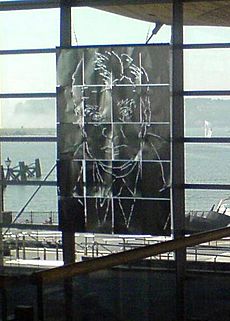
Bevan's most important legacy is the National Health Service. He knew it would always be debated, warning that it "must always be changing, growing and improving." But decades after it was founded, the NHS is still very popular. A 2013 poll found it was more popular than the monarchy, the BBC, and the British Armed Forces.
Bevan was known for his amazing public speaking. Robin Butler, Baron Butler of Brockwell, called him "the greatest parliamentary speaker since Charles James Fox." Even Winston Churchill, who Bevan often criticised, said Bevan was "one of the few members that I will sit still and listen to."
Bevan had a reputation as a strong socialist. Sir William Douglas, who worked with him in the Ministry of Health, first said he would "never work with a man like that." But by the end, he called Bevan "the best minister we have had." Clement Attlee believed Bevan should have been the Labour Party leader but was held back by his personality.
A bronze statue of Bevan was put up in Cardiff in 1987. The Nye Bevan Estate in Clapton Park, London, was named after him.
The Aneurin Bevan Memorial Stones were placed at the start of the Sirhowy Valley Walk. Three smaller stones represent the three towns of his constituency (Ebbw Vale, Rhymney, and Tredegar), surrounding a larger stone for Bevan himself. In 2002, Bevan was voted the 45th greatest Briton of all time in a BBC poll. The next year, he was voted number one in the 100 Welsh Heroes poll. Many places are named after Bevan, including the Aneurin Bevan University Health Board and Ysbyty Aneurin Bevan, a hospital in his old constituency.
In 2015, Welsh actor Michael Sheen described Bevan as a mythical creature, saying, "He had cast-iron integrity and a raging passion."
See Also
 In Spanish: Aneurin Bevan para niños
In Spanish: Aneurin Bevan para niños
Images for kids
-
The Tredegar Query Club by friends including Aneurin Bevan and Walter Conway. Conway is in the middle of the picture. Aneurin is second from right on the back row and his brother Billy is second right on front row.
 | Mary Eliza Mahoney |
 | Susie King Taylor |
 | Ida Gray |
 | Eliza Ann Grier |


